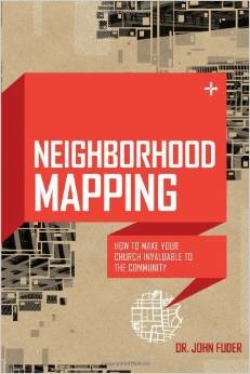“Our neighbourhoods are in a continual state of change. God is sending the nations to our cities and as Christ-followers embedded in local churches we are, at times, overwhelmed in how to respond.” Dr. John Fuder will provide some guidance April 7, as he leads World Vision’s Heart & Soul of the City Church Leaders Forum at Cariboo Road Christian Fellowship in Burnaby.
Fuder will draw heavily on Neighborhood Mapping: How to Make Your Church Invaluable to the Community (Moody Press, 2014). Following is an excerpt from that book, posted by permission.
Ten tips to exegete a culture1
As we start unpacking exactly what neighbourhood mapping, or community analysis, is and how to do it, let the following step-by-step process guide your journey. . . .
1. Go as a learner
Assume a position to understand, not judge the neighbourhood. This requires humility, persistence and the courage to push past your fears. An accepting and inquisitive posture can open doors into another culture. Linguist and missions author Betty Sue Brewster’s steps of cultural learning is helpful here: come as a learner, find ways to serve, seek to form friendships, weave God’s story into their story, and bathe everything in prayer.2
2. Seek out an “informant”
 Find an individual who is a gatekeeper, an insider, a “[person] of peace.” (Luke 10:6) This is someone who will let you in to his lifestyle or subculture. He is an expert who can teach you about his journey as “lived experience.” She is a model (albeit imperfect!) of another belief or practice and can connect you to that world.
Find an individual who is a gatekeeper, an insider, a “[person] of peace.” (Luke 10:6) This is someone who will let you in to his lifestyle or subculture. He is an expert who can teach you about his journey as “lived experience.” She is a model (albeit imperfect!) of another belief or practice and can connect you to that world.
3. Build a relationship
As much as you can, be a “participant observer”3 in that person’s life, culture and activities. A relationship, growing into a friendship, is key because in it a “trust-bond”4 is formed, and trust is the collateral of cross-cultural ministry. In the process, God is at work to break your heart for that community. (see Matthew 9:13; Luke 13:34)
4. Use an interview guide
You may not always “stay on script,” but it is helpful to work from an outline. You could apply the same categories already provided and then adapt the questions (see Appendix 1) within them to meet your specific needs.
5. Analyze your data
Depending on the formality of your community analysis, you will in all likelihood end up with some form of “field notes.” A crucial step, often neglected, is to examine your data for holes, patterns or hooks. What missing pieces could your informant fill in? What interests, activities or values are recurrent themes? Is there anything you could use to enter your informant’s world more deeply?
6. Filter through a biblical worldview
What scriptures speak to the information you are discovering? What does the Bible say about the activities, lifestyles and beliefs you are exegeting or reading in your neighbourhood? What would Jesus do, or have you do, in response to the needs? A biblical framework is your strongest platform on which to mobilize your church/ministry/school to action.
7. Expand into the broader community
Your informant can act as a “culture broker” to give you entry into the additional lifestyles and subcultures within the broader community. As you learn to “read your audience” (become “streetwise”) and develop credibility in the neighbourhood, you can leverage those relational contacts into greater exposure and deeper familiarity with the needs in your area.
8. Network available resources
As your awareness of the community grows, you will invariably feel overwhelmed by all there is to do, missionally speaking! You do not have to reinvent the wheel. Is anyone else working with that audience? Can you partner with another church, ministry or agency? With whom can you share and gather resources and information?
9. Determine what God is calling you to do
With your newly acquired knowledge about your community, what do you do now? Plant a church? Start a new ministry? Refocus your current programs? Much of your response will depend upon your personnel and resources. But you are now poised to do relevant, kingdom-building work in your community.
10. Continually evaluate, study, explore
Our hope in Christ is firm, but everything and everyone around us is in constant motion. Is your neighbourhood changing (again)? Who is God bringing to your community now? Is your church or ministry responsive to those opportunities? Are you winsome, relevant, engaging? We must always ask these questions, in every generation, in order to “serve the purpose of God.” (Acts 13:36)
1. John Fuder, A Heart for the Community (Chicago: Moody Publishers, 2009).
2. For more information, see Ralph Winter and Steve Hawthorne’s book, Perspectives
on the World Christian Movement, in which Brewster wrote a chapter.
3. James P. Spradley, Participant Observation (New York: Holt, Rinehart and Winston,
1980).
4. Marvin K. Mayers, Christianity Confronts Culture: A Strategy for Crosscultural Evangelism
(Grand Rapids: Zondervan, 1987).
Appendix 1: The Life History Interview
The following questions can be a guideline for you as form a life history of the individual with whom you are conducting an interview. Do not be bound by the subjects or order in which they are presented. Follow where you see the respondent’s interest.
A. Family
1. Who is in the family? What is the order of their birth?
2. Can you describe a specific incident which would characterize your relationship to your parents? Your sisters and brothers?
3. What were the most important goals of your parents for themselves? For the family? For you? What are your goals for yourself? For your family?
4. What are some of the most memorable family occasions in your life? Describe what happened and why it is special to you.
B. Residence
1. Where did you live? Tell me something about the place and the people.
2. What are the most memorable places and event in your home and community?
3. What kind of things happened at those places that are special to you?
C. Life Cycle
1. When you were growing up, what events do you remember that were most satisfying to you; you achieved a goal, or something happened which pleased you very much?
2. What happened on those special occasions? Who were the important people who helped make that happen? What meaning do these occasions have for you now?
3. What events did your family observe in your life and in the life of others? i.e. deaths, marriage birth, etc.
4. How did you and your family members participate in these events? What meaning did this have for you?
5. Tell me your personal story! What were the key events in your life?
D. Community and Friends
1. Who were special friends? How did you choose these people as friends?
2. What made these people special for you? How did you help one another?
3. How do you communicate with these people today, and about what subjects?
E. Beliefs
1. What did you learn about gods? How did this relate to your family’s interest?
2. What does your family believe about God and the supernatural?
3. How does your family cope with illness and disaster?
4. What do you believe about God and about God’s interest and concern about your life?
F. Questions of motivation primary to understanding meaning/action (This will help in your analysis of the life history material)
1. What are your informant’s most important goals over the span of their lives?
2. What are the key interests which preoccupy them at this point in time?
3. What are ordinary interests that compel your informant’s attention, although not central to “goals”?
4. What interest are reflected in your informant’s ordinary conversations? Daily routines?
5. How do informants order personal priorities as they relate to needs and goals?
G. Questions of motivation primary to understanding meaning/action (This will help you in the application of ministry)
1. What people and events have been most influential in helping your informant achieve goals and interests?
2. What message do you find in scripture that addresses your informant’s goals and interests?
3. What kind of relationship must you build to get your informant’s interest and attention?
For some related articles, go here.

